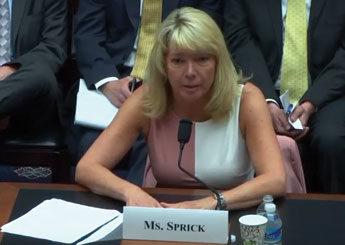Critics of OSHA recordkeeping rule air concerns at House hearing

Photo: House Workforce Protections Subcommittee
Washington – Critics of OSHA’s recently released recordkeeping rule, which would make worker injury and illness data public, voiced their concerns during a May 25 hearing convened by the House Workforce Protections Subcommittee.
The rule, Improve Tracking of Workplace Injuries and Illnesses, was published May 11. It states that establishments with 250 or more workers must electronically submit to OSHA – on an annual basis – information from their OSHA Forms 300, 300A and 301. Establishments with 20 to 249 workers in certain high-hazard industries will have to submit information from their annual summary form, OSHA Form 300A. The agency will then make information available on its website in a searchable database.
Industry stakeholders claim the rule’s requirements will be burdensome to employers, expose workers’ private information and fail to improve workplace safety.
Lisa Sprick, president of Corvallis, OR-based Sprick Roofing, testified on behalf of the National Roofing Contractors Association. Sprick said the reported injury and illness information will lack important context of the circumstances, such as the size of the business. For example, she said, if two companies have two injuries apiece, it will be unknown that one company has 100 workers and the other has two workers.
“Misuse of the information by third parties could be harmful to employers,” Sprick said. “It is not hard to imagine one of my competitors gathering this information and using it to sell against me. Another concern is possible inadvertent public disclosure of private employee information that could cause harm to my workers.”
Subcommittee chairman Rep. Tim Walberg (R-MI) said the regulatory changes will create “additional layers of red tape” for employers – particularly small business owners.
“The agency will need to spend millions of dollars on this special-interest tool, which will shift scarce resources away from proactive policies to improve safety, such as inspections and compliance assistance programs,” Walberg said. “And in the process, the agency is jeopardizing the privacy of workers’ personal information.”
However, supporters of the rule say it will help prevent injuries and illnesses and improve transparency. Rosemary Sokas, professor and chair of the Department of Human Science at Georgetown University’s School of Nursing and Health Studies, testified on behalf of the American Public Health Association.
“OSHA’s new recordkeeping rule will bring injury and illness reporting into the 21st century through an efficient web-based mechanism that allows employers to upload information they’re already collecting,” Sokas said. “This rule does not impose any new recordkeeping responsibilities, but rather requires the information to be electronically transmitted. Personally identifiable information will not be collected by OSHA, so that should alleviate most of the privacy concerns.”
Post a comment to this article
Safety+Health welcomes comments that promote respectful dialogue. Please stay on topic. Comments that contain personal attacks, profanity or abusive language – or those aggressively promoting products or services – will be removed. We reserve the right to determine which comments violate our comment policy. (Anonymous comments are welcome; merely skip the “name” field in the comment box. An email address is required but will not be included with your comment.)

